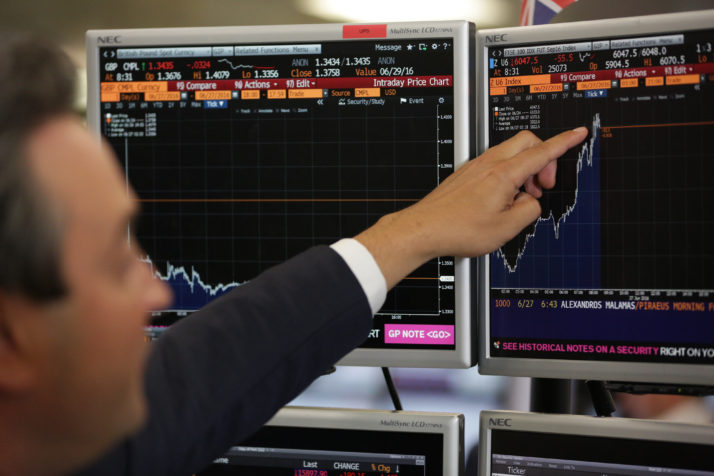- Stocks Drop as Energy Firms Slide With Ruble After OPEC Impasse
Energy shares led stocks in Europe lower, the Russia ruble weakened and oil touched a one-month low after the world’s biggest crude producers failed to agree to supply cuts at a meeting in Vienna. U.S. equity-index futures and Mexico’s peso clawed back some of their losses from Friday triggered by the FBI’s reopening of an inquiry into Hillary Clinton’s e-mails.
A gauge of energy companies on the MSCI All Country World Index slipped for a second day after the Organization of Petroleum Exporting Countries ended two days of talks on Saturday without agreeing any individual quotas.
Russia’s ruble declined while the South African rand surged after prosecutors withdrew charges against Finance Minister Pravin Gordhan. Perceived investment-grade credit risk was set for the longest run of increases since May.
The OPEC talks yielded little more than a promise that the world’s top oil producers would keep discussing ways to stabilize the market. Sovereign bonds were relatively muted Monday as investors awaited key central bank meetings from the U.K. and U.S. later in the week. Global equities lost ground in October and government bonds also slid amid speculation the Federal Reserve will hike interest rates this year.
“Oil companies are reacting to OPEC news,” said William Hobbs, head of investment strategy at Barclays Plc’s wealth-management unit in London. “We have a huge week of data, biggest in a long time. So people are positioning for what’s expected to be a pretty important week.”
Stocks
The Stoxx Europe 600 Index dropped 0.5 percent as of 7:19 a.m New York time, set for a sixth day of declines, the longest losing streak since February. The benchmark has fallen 1.1 percent in October, a month that has yielded gains in five of the past six years.
BP Plc and Tullow Oil Plc fell more than 1 percent, dragging a measure of energy companies to the worst performance of the 19 industry groups on the Stoxx 600, as oil declined after European markets closed Friday.
Miners gained the most on the index as metals prices advanced. Centamin Plc led the charge after saying it sees gold output near the upper end of its 2016 forecast.
WPP Plc led media companies higher, rising 4.1 percent after the world’s largest advertising company posted an increase in quarterly sales. Sika AG jumped 14 percent after a Swiss court backed its bid to block a takeover by Cie de Saint-Gobain. Shares in its French rival dropped 0.8 percent.
S&P 500 Index slid 20 points in about 40 minutes on Friday amid news the Federal Bureau of Investigation was again looking into Clinton’s use of private e-mail while secretary of state, an issue that has dogged her presidential campaign.
Futures on the gauge advanced 0.1 percent, indicating equities will rebound from Friday’s retreat to a six-week low. Investors will look to data Monday on personal income and spending for indications of the health of the U.S. economy as the Federal Reserve prepares to meet.
Among stocks moving in premarket New York trading, Baker Hughes Inc. gained 9.1 percent after General Electric Co. agreed to combine their oil and gas businesses to bolster their operations amid the global slump in crude prices. General Electric added 0.3 percent. Level 3 Communications Inc. climbed 3.9 percent after agreeing to a $34 billion cash-and-stock takeover offer from CenturyLink Inc.
For more news on the latest probe into Clinton’s e-mails, click here.
Commodities
Crude oil fell 0.6 percent to $48.40 a barrel in New York, trading near the lowest since the end of September. Oil has fluctuated near $50 amid skepticism about whether OPEC can implement the first supply cuts in eight years at an official meeting in November.
“Talks over the weekend make it seem less likely there will be an agreement on production cuts,” said Ric Spooner, a chief market analyst at CMC Markets in Sydney. “The market has probably made a fair bit of the adjustment, but I wouldn’t be surprised to see oil fall further into the $47 range.”
Gold was little changed at about $1,274.13 an ounce after rallying 0.6 percent on Friday.
Aluminum and zinc extended gains in Shanghai as investors bet that strong domestic demand, surging coal prices and logistical issues will underpin prices. Aluminum rose to its highest since September 2014, having jumped by about 10 percent last week, and zinc climbed to levels last seen in March 2011.
Currencies
The rand jumped 1.8 percent as South Africa’s Chief Prosecutor Shaun Abrahams announced that fraud charges against the finance minister have been dropped, two days before he was due to appear in court.
The Bloomberg Dollar Spot Index has climbed more than 2 percent this month, set for the biggest gain since May.
While the Fed is seen leaving policy unchanged at a review this week, futures prices indicate a 69 percent chance of an interest-rate hike at its December meeting, up from 59 percent at the end of September.
The ruble fell 0.2 percent, declining for a second day and set for its first monthly drop in three.
Mexico’s peso advanced 0.4 percent as Clinton’s allies escalated attacks on FBI Director James Comey to stem political damage from his disclosure last week the agency is reviewing files related to a probe of her e-mail practices.
South Korea’s won traded near a three-month low as President Park Geun-hye deals with an influence-peddling scandal that’s sparked calls by the ruling party for her to remove the prime minister. Prosecutors raided Park’s office over the weekend to investigate allegations her close friend Choi Soon-sil — a private citizen whom opposition lawmakers have linked to a religious cult — wielded influence on state affairs over an extended period.
China’s yuan strengthened 0.2 percent, paring its biggest monthly loss since May. It advanced from near a six-year low following Friday’s retreat in the dollar and as China’s clampdown on UnionPay payments for insurance products in Hong Kong provided support. The transactions have been used as a means of skirting capital controls to take funds out of the mainland.
Bonds
The yield on Treasuries due in a decade was little changed at 1.84 percent, after touching a five-month high of 1.88 percent on Friday. Sovereign debt in the world’s biggest economy has lost 1.2 percent on average this month, the worst performance since February 2015, a Bloomberg index shows.
Germany’s 10-year bond yield was at 0.16 percent, up 28 basis points this month, which would be the biggest increase since May 2013.
Spanish 10-year bond yields were little changed at 1.23 percent, after Mariano Rajoy claimed a second term as prime minister by winning a confidence vote on Saturday night, ending a 10-month political impasse.
The cost of insuring investment-grade corporate bonds against default climbed for a fifth day. The Markit iTraxx Europe Index of credit-default swaps on highly rated companies rose one basis point to 73 basis points, a two-week high. A gauge of swaps on junk-rated corporate issuers rose for a fifth day, the longest run since June. It added three basis points to 332 basis points.
China’s one-year interest-rate swaps rose five basis points to an 18-month high of 2.76 percent in Shanghai. The increase reflects speculation policy makers will seek to keep money rates high as they tackle asset bubbles and try to stem declines in the yuan.


 Billionaire Watch3 weeks ago
Billionaire Watch3 weeks ago
 Startups4 weeks ago
Startups4 weeks ago
 News4 weeks ago
News4 weeks ago
 News4 weeks ago
News4 weeks ago
 Bitcoin4 weeks ago
Bitcoin4 weeks ago
 Naira4 weeks ago
Naira4 weeks ago
 Forex3 weeks ago
Forex3 weeks ago
 Treasury Bills4 weeks ago
Treasury Bills4 weeks ago
























